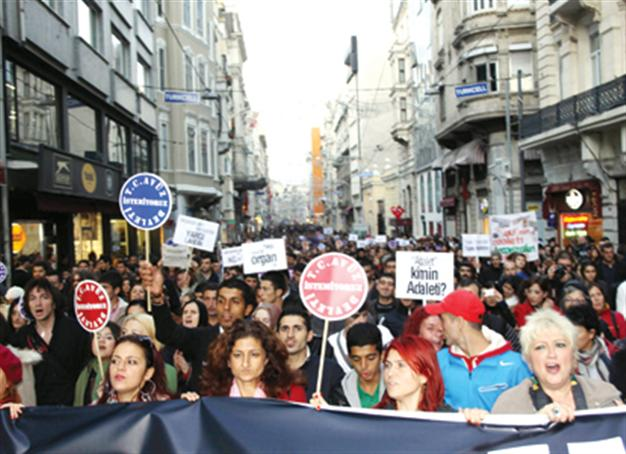Appeal stage over for debated rape verdict
ANKARA – Radikal

Women organizations and activists around Turkey came together in a recent march in Istanbul to protest the legal decision and sentencings over the case. DHA photo
The chief prosecutor of the Supreme Court of Appeals has not challenged an appeals court decision to approve minimum sentences for 26 convicts for raping a 13-year-old girl in the southeastern province of Mardin in 2002.
An earlier decision by the Supreme Court of Appeals’ 14th Criminal Department to ratify the local court verdict on Oct. 31 had led to a public outcry. But following remarks made by officials indicating the entire judicial process was yet to be exhausted led many to hope the verdict could still be altered.
The decision by the prosecutor’s office Thursday, however, has finalized the verdict, despite calls from high quarters within the government for the decision to be reviewed, including President Abdullah Gül, Justice Minister Sadullah Ergin and Deputy Prime Minister Bekir Bozdağ, who had publicly referred to the decision as “deeply disturbing” on Nov. 3.
“This ruling takes its place in Turkish judiciary history as one of the defective rulings. I hope the deadline for the correction of the ruling has not passed. If not, and if the Supreme Court corrects the ruling, they [could rectify the situation],” Bozdağ told reporters a few weeks ago.
The appeals court’s prosecutor’s office stood by the decision to sentence 24 of the suspects to between four years and two months and four years and 10 months in prison, while one juvenile suspect was sentenced to three years and two months of imprisonment.
The sentences were reduced down from five years due to “good behavior.”
The 13-year-old victim, identified only by her initials N.Ç., met the female suspects T. and E., also identified only by their initials, in 2002, after which time the two women facilitated the victim’s having intercourse with 26 individuals in exchange for money.
The prosecutor’s office also backed the earlier judicial decisions by tacitly accepting that no violence or physical coercion had been used to rape the victim and that N.Ç. had willfully engaged in intercourse with the convicts.
The 26 convicts who raped N.Ç. included soldiers, civil servants, shopkeepers and teachers.
Reports further indicated the Ministry of Justice reserved no legal right to intervene in the final verdict, while the Prosecutor’s Office of the Supreme Court of Appeals also waived its right to object to the Criminal Department’s decision after a grace period of 30 days expired Thursday.
Under the current circumstances, the file will once more go back to the local court in Mardin where some technical adjustments will be made in accordance with the appeals court’s ruling, according to reports.
















